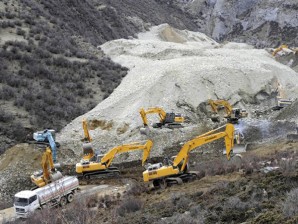Slim chance of life after Tibet mudslide buries 83

In this photo released by China’s Xinhua News Agency, earthmovers remove rocks and mud on the scene where a landslide hit a mining area in Maizhokunggar County of Lhasa, southwest China’s Tibet Autonomous Region, on Friday, March 29, 2013. The large landslide trapped dozens of workers in the gold mining area, state media reported. AP
BEIJING — Emergency crews in Tibet slogged through pileups of earth up to 30 meters (100 feet) deep Sunday after a massive mudslide at a gold mine buried 83 workers, and authorities said chances were slim for finding any survivors.
The disaster has spotlighted the extensive mining activities in the mountainous Chinese region of Tibet and sparked questions about whether mining activities have been excessive and destroyed the region’s fragile ecosystem.
The workers were buried early Friday when mud, rock and debris swept through the mine in Gyama village in Maizhokunggar county and covered an area measuring around 4 square kilometers (1.5 square miles), about 70 kilometers (45 miles) east of the regional capital Lhasa.
By Sunday morning, searchers had found only two bodies and were searching for the remaining 81 missing workers, said an official of the Tibet regional government in Lhasa who gave only his surname, Jiang. The Communist Party deputy secretary for Tibet, W. Yingjie, was quoted by the state Xinhua News Agency as saying chances were slim of finding anyone alive.
The miners worked for Huatailong Mining Development, a subsidiary of the China National Gold Group Corp., a state-owned enterprise and the country’s largest gold producer. Beijing says the cause of the disaster is yet to be fully investigated, although state media say the mudslide was caused by a “natural disaster,” without giving specifics.
Article continues after this advertisementCriticisms over possibly excessive mining in Tibet flashed through China’s social media Saturday before they were scrubbed off or blocked from public view by censors.
Article continues after this advertisementBtan Tundop, a Tibetan resident, noted the mining company’s dominance in the area in a short-lived microblog: “The entire Maizhokunggar has been taken over by China National Gold Group. Local Tibetans say the county and the village might as well be called Huatailong.”
Tibetan writer Tsering Woeser, who has been following the mining development in Gyama and surrounding areas since 2007, said China’s powerful but resource-hungry state-owned companies had ravaged the landscape.
“Unchecked mining has polluted water, sickened animals and humans, dislocated herdsmen and now caused a massive mudslide,” Woeser wrote Saturday on her blog.
The Chinese government has been encouraging development of mining and other industries in long-isolated Tibet as a way to promote its economic growth and raise living standards. The region has abundant deposits of copper, chromium, bauxite and other precious minerals and metals, and is one of fast-growing China’s last frontiers.
Tibet remains among China’s poorest regions despite producing a large share of its minerals. A key source of anti-Chinese anger is complaints by local residents that they get little of the wealth extracted by government companies, most of which flows to distant Beijing.
Wangchuktseten, a Tibetan scholar at Northwest University of Nationalities in Lanzhou, the capital of Gansu province, said he was most worried about the environment. “The Tibetan plateau is considered the lungs of Asia,” he said. “Those short-sighted mining activities chase after quick benefits but ignore the environment for future generations.”
State media said that two of the buried workers are Tibetans, and that two are women.
Chinese President Xi Jinping and Premier Li Keqiang ordered authorities to “spare no efforts” in their rescue work, state media have reported.